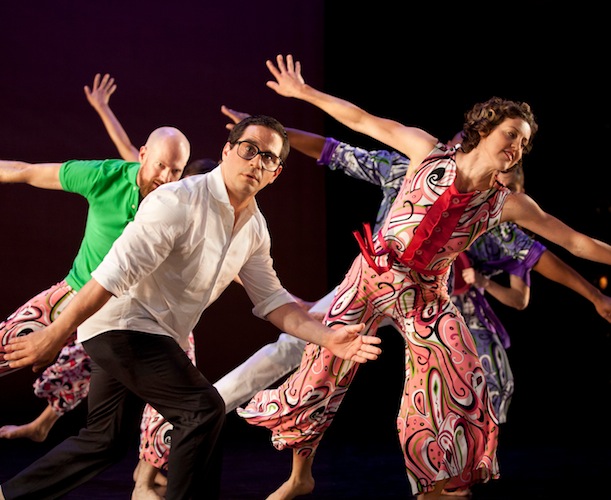Dance Review: Hat Trick — Doug Elkins at Jacob’s Pillow
Doug Elkins’ take on Othello is entirely of our era, when domestic abuse is finally a public discussion and a complex story of betrayal can be conveyed with pop culture efficiency.
doug elkins choreography, etc. At Doris Duke Theatre, Jacob’s Pillow, Becket MA through August 17.

Aaron Mattocks, Mark Gindick, and Donnell Oakley in doug elkins choreography, etc.’s “Hapless Bizarre.” Photo: Jamie Kraus.
By Debra Cash
Pass the fuscia derby. Don the knock-off Pucci prints. Doug Elkins‘s postmodern circus is back in town in Hapless Bizarre, where a collision of dated etiquette rules and retro music larded with tooty flutes and greasy violin flourishes drags along a pastiche of dance genres.
It’s all very Looney Tunes, with Big Apple Circus clown and performance artist Mark Gindick in his oversize, black-rimmed glasses standing stunned among the sashaying dancers. Aaron Mattocks and Donnell Oakley wriggle across the floor like stranded fish; Gindick flails across the floor on the verge of being gulped down by the snakey Deborah Lohse, whose foot is hinged across the back of his neck.
Elkins’ talent for invention is on display in a series of partnered lifts that play out like a manual for a series of barely replicable sailors’ knots. When the dancers play crack the whip, their hands are glued together, and they end up in a traffic jam of Petipan proportions. The joke, although it’s an unaccountably mild one that loses steam over the course of some not quite jelled variations, is on the clown. As all of the other dancers lunge into jazzy diagonals, Gindick remains resolutely vertical. The man’s a square.
Vaudeville hat passing was featured in Elkins’ rightly popular gender-bent send-up of Rodgers and Hammerstein’s Sound of Music, Fraulein Maria. (Gindick participated in least one version of that show’s ever-changing cast.) Against the sugary lilt of “Eidelweiss,” a Tyrolean cap became a sneaky depiction of Nazi domination. In Hapless Bizarre domination is always temporary as the dancers pass the hat around with a wink and a nod.
Yet domination, in its ruthless male version, is at the heart of Elkins’s Mo(or)Town/Redux. Deconstructing Othello, Elkins drew on both the familiar Shakespearian tragedy and Jose Limon’s indelible 20-minute danced distillation of the play, The Moor’s Pavane. Elkins and his musical collaborator Justin Levine layer a rich Motown and Stax mixtape over the dancing. From its first scene, Mo(or)Town/Redux bridges two heretofore unconnected types of classics. Kyle Marshall, wearing a showman’s white suit, is Othello, fondling a microphone on its stand as James Brown asserts “This is a man’s world/But it wouldn’t be nothing, nothing/Without a woman or a girl.”
I got tired of every lanky lift being revved into the air by a spin (Elkins leans on his own tricks more than is necessary) but believed in Donnell’s innocent party girl turned wronged wife, and the way Cori Marquis’ lurched into S/M as Alexander Dones wrapped her wrists and traced her hips with the handkerchief. I appreciated the subtle quotes from The Moor’s Pavane in Mo(or)Town/Redux‘s insinuating whispers and the way the Iago character (the compact, b-boying Dones) clings to Othello’s back like a parasite. If you looked closely, you could also see the fingerprints of Cholly Atkins, the choreographer who gave Motown’s singers their silky, distinctive moves.
Doug Elkins’ take on Othello is entirely of our era, when domestic abuse is finally a public discussion and a complex story of betrayal can be conveyed with pop culture efficiency by a crumpled bit of fabric and the organ vamp of Marvin Gaye’s “I Heard it Through the Grapevine.”
Debra Cash has reported, taught and lectured on dance, performing arts, design and cultural policy for print, broadcast and internet media. She regularly presents pre-concert talks, writes program notes and moderates events sponsored by World Music/CRASHarts and cultural venues throughout New England. A former Boston Globe and WBUR dance critic, she is a two-time winner of the Creative Arts Award for poetry from the Hadassah-Brandeis Institute and will return to the 2014 Bates Dance Festival as Scholar in Residence.
c 2014 Debra Cash
Tagged: Aaron Mattocks, Deborah Lohse, Donnell Oakley, Doug Elkins, Hapless Bizarre, Jacobs-Pillow, Mark Gindick, Mo(or)Town/Redux
